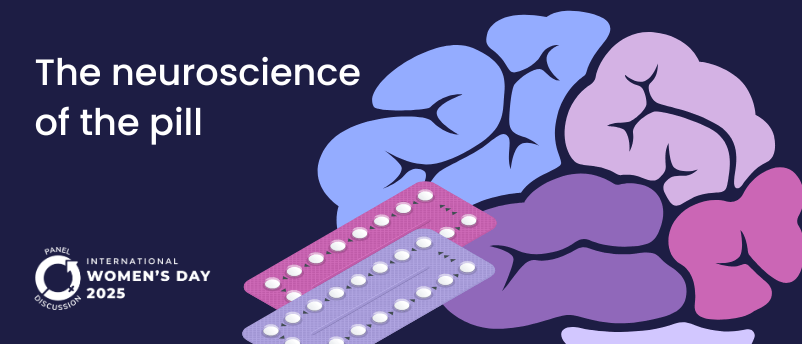Panel Discussion: The neuroscience of the pill

NOW AVAILABLE ON DEMAND
Join our Panel Discussion on the neuroscience of the contraceptive pill for International Women’s Day 2025 to hear from leading experts on what we know, what we don’t and why this conversation is so important.
Since the combined contraceptive pill was introduced in the 1960s, women have used it as an effective means of achieving reproductive freedom. However, despite over 150 million people worldwide taking it, we know relatively little about the pill’s effects on the brain.
In this Panel Discussion, we’re joined by experts in the field to discuss how the pill impacts the brain, the questions that still need to be answered and the techniques being used to answer those questions. We’ll also explore why there is such a big research gap in this area and the challenges of getting funding.
What will you learn?
- What impacts can the pill have on the brain?
- Why is there such variability between people?
- What key techniques are used to investigate the pill and the brain?
- Why are there significant gaps in research into the neuroscience of the pill?
Who this may interest?
-
Neuroscientists
-
Scientists with an interest in women’s health
Speakers
 Nafissa Ismail
Nafissa Ismail
Full Professor
University of Ottawa (Canada)
Nafissa Ismail is a Full Professor at the School of Psychology at the University of Ottawa (uOttawa) and the holder of a University Research Chair in Stress and Mental Health. She is also the Director of the LIFE Research Institute at uOttawa. She obtained her PhD from Concordia University (Montreal, Canada) in 2009. She then completed a post-doctoral fellowship at the University of Massachusetts (MA, USA) and joined uOttawa in 2012. Nafissa’s expertise is in neuroimmunology, neuroendocrinology and women’s health research. She was awarded Young Researcher of Year by uOttawa in 2017 and the Early Researcher Award by the province of Ontario in 2018. In 2021, she was awarded the prize for activity in the media and the community by the Faculty of Social Sciences. Nafissa is also a member of the Global Young Academy (2020), and she was elected to the College of New Scholars, Artists and Scientists of the Royal Society of Canada (2022). In October 2023, she received the Governor General’s medal in Commemoration of the Persons Case.
 Caitlin Taylor
Caitlin Taylor
Ann S. Bowers Women’s Brain Health Initiative Director of Operations and a scientist
University of California Santa Barbara (CA, USA)
Caitlin Taylor is the Ann S. Bowers Women’s Brain Health Initiative (WBHI) Director of Operations and a scientist in the Department of Psychological & Brain Sciences at the University of California (UC) Santa Barbara (CA, USA). In these roles, Caitlin coordinates efforts for the WBHI Brain Bank, a UC-wide brain imaging consortium, and leads research to understand how hormone-based medications, such as oral contraceptives, affect the brain. She is a graduate of Indiana University (IN, USA) and Georgetown University (DC, USA).
Belinda Pletzer
 Full Professor
Full Professor
University of Salzberg (Austria)
Via master studies at the Paris-Lodron-University of Salzburg (Austria), Belinda obtained an interdisciplinary background comprised of biology, psychology, philosophy and mathematics. She obtained two PhDs in Philosophy and Cognitive Neuroscience and spent her first postdoc year at the University of California, Irvine (CA, USA), researching the effects of sex and sex hormones on processing strategies during cognitive tasks. After returning to Austria, Belinda pursued this question including brain parameters within the framework of a single investigators project funded by the Austrian Science Fund. The results were summarized in her habilitation thesis in Psychology.
Belinda’s research interests comprise all aspects of hormone–brain interactions, with a particular focus on sex hormones and sex-related aspects of neuroscience. She is currently the principal investigator of the ERC Starting Grant BECONTRA, which investigates the effects of hormonal contraceptives on the female brain.
Recorded March 4 2025.
In association with

and
